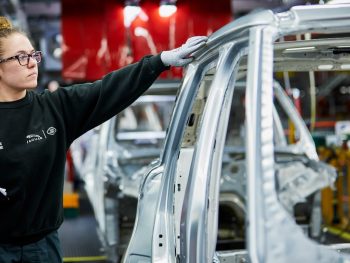UK car production plummets to lowest level in 66 years
Annual car production in the UK has fallen to its lowest level since 1956, prompting calls for fresh support for carmakers and electric vehicles.

UK car production last year fell 9.8% compared to 2021 but was more notably down 40.5% on the 2019 pre-pandemic output
A total of 775,014 cars rolled off UK production lines in 2022, down 9.8% on 2021 but more notably down 40.5% – or half a million cars – on the 2019 pre-pandemic output, according to new figures from the Society of Motor Manufacturers and Traders (SMMT).
The mass downturn in production was the result of the continued – and “crippling” – global chip shortages, but also due to significant structural changes that hit production at two major manufacturing sites and the impact of supply chain pauses in China due to Covid lockdowns.
Electrified vehicles however saw record production levels, reaching a total of 234,066 battery electric (BEV), plug-in hybrid (PHEV) and hybrid (HEV) electric vehicles, which was up 4.5% year-on-year and accounted for almost a third (30.2%) of all car production. Total BEV production rose 4.8%, with hybrid volumes up 4.3%.
The SMMT said the data showed that boosting output of electrified vehicles was critical for the success of the industry and for net zero plans, both in the UK and overseas.
And it’s calling for a dedicated framework to drive rapid upscaling of UK battery production and the shift to EVs; just days after UK battery startup Britishvolt collapsed into administration.
Mike Hawes, chief executive, said: “The potential for this sector to deliver economic growth by building more of these zero-emission models is self-evident, however, we must make the right decisions now.
“This means shaping a strategy to drive rapid upscaling of UK battery production and the shift to electric vehicles based on the UK automotive sector’s fundamental strengths – a highly skilled and flexible workforce, engineering excellence, technical innovation and productivity levels that are amongst the best in Europe.”
SMMT analysis also reinforces the increasingly important role of electrified vehicle production to the UK economy, especially the value of exports. Since 2017, the value of BEV, PHEV and HEV exports has risen seven-fold, from £1.3bn to more than £10bn.
The industry body also stressed the importance of free and fair global trade; while total annual output for the UK rose 9.4%, this failed to offset declining exports, down 14.0%. Despite this, some eight in 10 cars were shipped overseas.
Specialist, luxury and performance models were particularly in demand, with output climbing 6.6% to 32,575 units, worth an estimated total of £3.7bn at ‘factory gate’ prices, driven by a number of new launches and models in high demand from buyers around the world.
The SMMT also published latest independent figures forecasting a rise in UK car and light van output for 2023 on the back of easing semiconductor shortages. Production is expected to rise by 15% to 984,000 units this year (842,200 cars and 141,800 light vans), an uplift worth some £3.9bn. By 2025, production volumes are projected to exceed a million vehicles.
Overcoming the barriers to investment
The data has led to further warnings that the UK is lagging behind on support to carmakers, despite potential to become a leader in global car production, in particular for electric vehicles.
A recent report by the Coalition for the Decarbonisation of Road Transport (CDRT), part of the Green Finance Institute, highlighted the opportunity to invest in the burgeoning global demand for EV batteries, which will underpin the future of road transport.
But Suzanna Hinson, lead of battery workstreams at the Green Finance Institute’s Transport Team, warned that it’s a “a very narrow window of opportunity”.
“If we miss it, we’re likely to see a continuation of this trend as manufacturers continue to move towards electric product lines but don’t see the benefits of keeping manufacturing in the UK. Once they move abroad it is much harder to convince them to return to the UK and we’ll see both jobs and economy suffer.
“To mobilise this necessary finance and save our car manufacture sector, we must address the barriers to investment. We have identified seven solutions that have enormous potential to mobilise private capital at the pace and scale required to accelerate investment in the battery supply chain and put the UK on the global stage for car production.”
KPMG also spoke of the challenges and opportunities for the UK automotive sector when it comes to electric vehicles.
Richard Peberdy, UK head of automotive, said: “The market share growth achieved in the UK for electric vehicles is strong given the context, but the race for countries to be seen as world leaders in electric vehicle production is well underway.
“The UK’s position globally for manufacturing electric vehicles and parts in much higher volume still depends on investment in battery manufacturing and related skills. At this time, it remains uncertain where that is coming from.”












